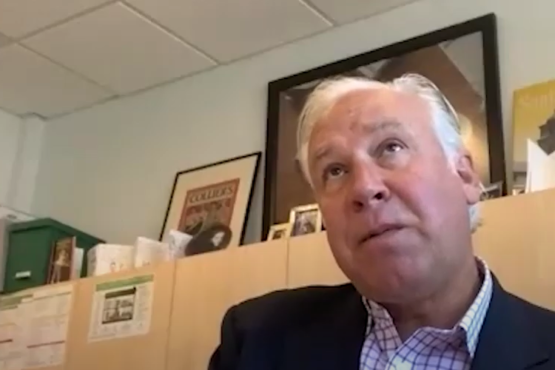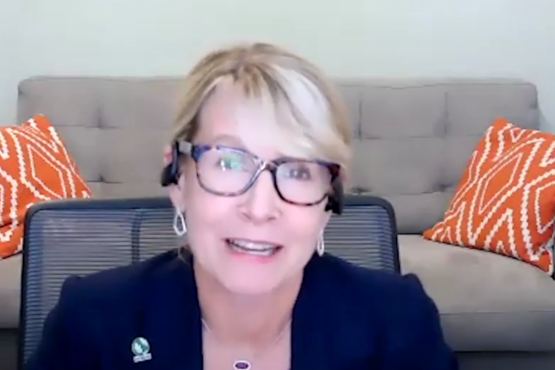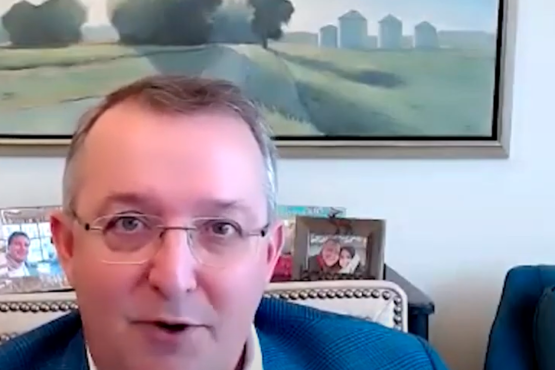Welcome to A Second Opinion podcast, where we are rethinking American health. I’m your host, Senator Bill Frist. To make sense of all the dynamic perspectives in healthcare, you need a trusted source engaging at the intersection of policy, medicine, and innovation. You need A Second Opinion, a podcast where it all comes together. Brent Shafer is chairman and CEO of Cerner, the largest electronic health record company in the world. We discuss the phenomenal degree of change that we’ll see in healthcare over the next five years and the technology driving that change. I’m your host, Senator Bill Frist. Welcome to A Second Opinion.
Senator Bill Frist: Brent, great to have you with us today. Let’s start right off with a question that all of our viewers and all of our listeners are thinking about constantly. And it really goes to what I’ve heard you say in the past, and that has been that the amount of change that we will see in health and health care over the next five years is greater than what we’ve seen in the last 30 years. Tell us a little bit about that, why you say that, and some of your predictions of what sort of change we’ll be seeing.
Brent Shafer: Well, it’s an exciting time. We all know the macro trends with an aging population and increased chronic conditions that go with that, that need management. So a lot of demand on the system and you can see that’s going to continue for years. So the demand is very high and there’s not enough resources to address all that reasonably. And then, what’s happening in technology is moving so fast now with AI and machine learning and what’s possible there.
Brent Shafer: So I think that opens up on the technology side and solutions that can be brought forward, just a phenomenal degree of change that’s going to come in the years ahead. I think, for the better. Some of the barriers that are there is still alignment of payments, and we have some integration across the different ways we provide care. It’s still a barrier, but the technology is going to move very fast.
Senator Bill Frist: So predominantly information technology and the technology driving that change, which leads me, and we can talk a little bit over our conversation, things seem to be pretty optimistic in truth with all these big challenges that we have out there. Cerner has always been known as an EHR platform, actually in the electronic health record long before anybody else in terms of making it sort of the thrust of the momentum, the center of gravity of the company itself. Today, over the last year and a couple of years, and really with your tenure, I’ve noticed a shift that the EHR is there and is still fundamental, but it’s not where the focus is. Has there been a pivot off that or an evolution from the EHR?
Brent Shafer: Yeah, good question. I’d say it’s an evolution. I mean, it’s foundational to who we are and what we do. We’re a 40-year- old company now and really helped invent what the EHR is for … Whatever you like or dislike about it, we were there from the beginning. It started at a department level and built it up.
Brent Shafer: But we’re trying to really acknowledge that we go beyond the EHR. So we have three primary platforms. The EHR itself, we have one called CareAware that connects to all the devices in the care environment into the EHR, and then we have a platform called Healthy Intent that really helps us go beyond the EHR into various applications for population health, managing populations.
Brent Shafer: So it’s really a tool set that is EHR agnostic, that helps facilitate that kind of care. And that is, we’re seeing very high growth in that area. We think there’s a ton of potential because the need as you build care delivery networks, they’re rarely captive to one system anymore, right? So you need to be able to move that data and follow the patient through all the care settings as you manage them.
Senator Bill Frist: Yeah, talk a little bit more about that. The EHR has been interesting. And I practiced medicine starting in the early 1980s and have been a part of that evolution, and the EHR has become a huge burden on the individual physician and practitioner. Not to anybody’s, nobody intended it to be that way, but the huge value in the exchange of information in a privacy protected way. We all understand it’s so fundamental, and the aggregation of data now with artificial intelligence today.
Senator Bill Frist: The risk with digitization of the cyber end of things is huge, and in talking to people such as yourself, because of that digitalization of data. How do companies such as Cerner prepare for that? Nobody can be fully prepared. And again, you can close down ventilators in hospitals through cyber attacks, so it’s not just getting access to records. But give our listeners just a feel for how you prepare for something like that.
Brent Shafer: Well, yeah, it’s a robust effort that’s ongoing. So, and we do self audits on an ongoing basis. And the work we do with the government, with the DOD and VA, keeps us really on the leading edge because they demand, require that for obvious reasons. So that’s a real benefit to us, because it forces us to really focus on our efforts there and stay very current all the time.
Brent Shafer: It’s been explained to us many times that they are frequently a target, and therefore, we are too. And so, you can never do enough. But we really spend a lot of time preparing and-
Senator Bill Frist: Tell me about the VA relationship and the Department of Defense. I know you’ve been at it a long time in terms of getting to the point we are today, but give me some perspective on what you’re doing and where you’ll be going from here.
Brent Shafer: We’ve been working with the DOD for a couple of years, so we are into an implementation process there of about eight facilities. But we will do all of the DOD. We’re also working with the coast guard. We’ll be providing for all of the coast guard. And then, the very large portion is the agreement we have to implement across the VA.
Brent Shafer: So 1600 facilities with the VA. So the scope of the work is about, it’s a 10-year project to do that.
Senator Bill Frist: And what Cerner is providing them that they didn’t have or replacing is what?
Brent Shafer: It really is an EHR, but it is an EHR that goes beyond acute care. And there’s also the provision in there to provide a bridge into community care because they need to be able to follow the patient as they move throughout a VA system or into local community facilities and back in, so to follow them through their lifetime. So that is the core is the EHR offering. And the VA, if you know the history of the VA there, they had a very early internally developed system called Vista that served them well for many years.
Senator Bill Frist: And way ahead of the private sector.
Brent Shafer: Way ahead. And so, but their desire now is to get something that’s more of a standard, a commercial standard, because their maintenance costs were very high. And of course, technology has moved on a long way. And so, we’re early in the deployment process there, but a lot of great work in really thinking about, together with the VA, how to improve care for veterans and improve access and-
Senator Bill Frist: The whole VA history is an interesting one. When I started practicing in the VA system in heart surgery in 1983. And so, really, for the next 15 years, I did a surgery every week in a VA system. And I noticed as I would go back and forth between Stanford and the VA, and at Vanderbilt and the VA, early on the electronic health record and the veteran system was much superior, much more sophisticated, more sharing of data, better measurement of inputs, measure of processes and outcome. And it was always this juxtaposition of thoughts, because people said, that’s big government, they can’t do anything well. And yet, in the private sector, they did very well. But my impression is that became very rigid, very bureaucratic, built on legacy software that couldn’t adapt with time. But you will be replacing that-
Brent Shafer: We’ll be replacing that.
Senator Bill Frist: Over time totally?
Brent Shafer: But you have to look at that as that system certainly served the VA well for many years. It’s just things have progressed and moved on and-
Senator Bill Frist: It comes back to your change. Things are changing so fast-
Brent Shafer: Very quickly.
Senator Bill Frist: And your involvement in population health as part of the electronic health record, clearly the VA system didn’t do that sort of thing.
Brent Shafer: Yeah, correct.
Senator Bill Frist: And then, I’ve been reading a lot that under your leadership, you’ve really moved to the web and Amazon web services in a significant way. Tell me a little bit about the thought process of moving so aggressively to the web.
Brent Shafer: We have, as I mentioned, there’s three primary platforms that we work with, and two of them are already web enabled and cloud enabled, excuse me. So the large core database, the Millennium, the core EHR needs to move that direction. And then the main issue there is it lets you move innovation to the market faster. So that’s the real advantage. It helps on the cost side. It reduces the cost of developing, it accelerates the speed of developing.
Brent Shafer: And we’ve also found that a lot of our clients, our users, they have chosen to use certain functionality they implemented in, it might’ve implemented in 2000 or 2005, and there’s functionality that is better for the users, can enhance the experience. But it’s somewhat difficult to upgrade, it takes a lot of work and to retrain. And as you move in the direction of a cloud based offering, you can do that more readily. It’s quicker. You can continue to bring functionality for it, much like on your phone.
Senator Bill Frist: Almost in real time.
Brent Shafer: New functionality shows up every week or two and it’s easier to implement and easier to train.
Senator Bill Frist: So just so I have a good image, does that mean that every electronic health record for an individual or a patient, obviously it’s becomes digital, but every one of those is in the cloud?
Brent Shafer: That’s ultimately what it will mean. Now most EHR records are hosted remotely today. So in a sense, it’s not that different, it’s just where does it reside. But it has to do with how the design, the architecture of the system itself, of the offering, and the ability to move that forward quickly.
Brent Shafer: I would tell you one of the things, we’re talking about innovation, time to get an innovation to market, what it also lets you do is utilize the most current development tools and AI machine learning to get at improving that user experience. And so, you were talking a little bit of the history of EHR. So, I mean, the good news is, in U.S. healthcare, it’s largely digitized now. If you think about the foundational work, the pipeline has been laid. It’s mostly digital, but a lot of it’s still very difficult to use, right? And it’s time intensive. There’s a lot of data entry still and there’s been a lot of improvement in dealing with workflows, but that can get better.
Brent Shafer: But as you have these new tools now, you think of what’s possible on your phone, and so on, in the consumer environment, we want to start applying those kinds of tools and techniques to reduce that data input time so that the physician and the clinician is able to focus on the patient and interacting with the patient, rather than so much data entry and keyboarding.
Senator Bill Frist: And do you get involved in things like voice activation?
Brent Shafer: We do. We have a pilot program, we’re about two years in there, that’s very promising that … It’s keyed in, contextually aware, so the intent is to be able to plan in a way where it can dialogue between a physician and a patient. It can identify that dialogue as unique and click in just key words, and be able to document that for you rather than having to enter it all.
Senator Bill Frist: It is so-
Brent Shafer: So it’s very promising.
Senator Bill Frist: So important that I have that virtual scribe approach, just as a doctor and a patient. Unfortunately today, you only have 10 minutes, six minutes, 15 minutes with a patient. And to have the doctor either have a scribe and they’re typing everything down, which is distracting. And this is going back to the old doctor patient empathetic relationship, which is so important to establish trust, but if you don’t have the eye contact and you’re sitting there typing, and the government requires certain things and the payers require certain things, it’s just hugely distracting. So I love the fact that you are moving in that direction.
Senator Bill Frist: Tell me, if you have to describe Cerner today, because people have this image of EHR, but in the public and in all your speaking, how would you describe Cerner in terms of size or reach, or purpose?
Brent Shafer: Well, the company’s mission is based around improving healthcare. And the way we remind ourselves is that is by the phrase, “healthcare is too important to remain the same.” And that was coined by the founder and that, we try to make that the lens on everything we do, is to move healthcare forward, to make it better, to help the user experience, the clinician experience, and better outcomes. So that’s the lens.
Brent Shafer: So we’re about five and a half billion in revenues. We have 30,000 associates around the world. Our largest concentration’s in Kansas city, but we have a big site in Pennsylvania, we have a big site in India that’s growing significantly, a big, good size site in London. So we’re in 11 countries, and in those 11 countries we are the number one or number two market share position in the markets we serve. So where we engage, we try to make sure we engage fully and can be present and can give the right levels of service.
Senator Bill Frist: And revenues, percent global or international versus here.
Brent Shafer: The majority is domestic. Our U.S. is by far the biggest market for us and really for this whole category. But there’s a lot of opportunity globally, the way healthcare is delivered very significantly country by country. And so, when you’re doing the kind of work we do, there’s a lot of localization that’s required. So you have to be very thoughtful about how many countries do you want to be in, and can you get all those requirements cracked in the way that they deliver healthcare locally?
Senator Bill Frist: It’s challenging, challenging. And tell me, you’ve been at Cerner how long and the biggest changes that have happened over that period of time?
Senator Bill Frist: I’ve been at Cerner just two years, within a couple of weeks. And so, it’s been a busy two years. As I mentioned a little bit, it’s a 40-year-old company. Dynamic group of founders that started the business, really visionaries and very driven. And so, a history of aggressive growth and building out the EHR and beyond, and really a founder led culture.
Senator Bill Frist: And so, on a personal level, it’s interesting to come in. The founders are not active in the business anymore. The key founder passed away a few years ago. And so, to transition from a founder led culture, which is, there’s particular ways things are done in a founder led culture. And to come in to be the first one to follow is unique and exciting. And so, I think we have a lot of good transitions underway that are positive and-
Brent Shafer: This podcast, we concentrate really at that intersection of policy, and I’ll come back to that shortly, and the whole clinical and medical delivery, coupled with innovation. And it seems that you’ve really, you’ve moved from a great tradition and a great company with EHR that’s had great, great growth, but much more into the innovation world, that sector coming in, just listening and watching what is happening. Before you came to Cerner, tell me a little bit about and tell our listeners a little bit about what you were doing and what your observations were. Because again, you came to this founder led company that has a great tradition, and then you come in to make a new mark with teams of people. What’s your experience with doing either that before or being in a founder led company or a company that’s been transforming?
Senator Bill Frist: Yeah, that was a great question. So I’ve been in healthcare about 40, excuse me, 34 years, not 40 yet.
Brent Shafer: Not yet.
Senator Bill Frist: I hope to make it.
Brent Shafer: Slow him down.
Senator Bill Frist: That’s right. Just prior to coming into Cerner, I had been with Phillips based in the Netherlands. So the company based there, one of the big, large international electronics companies, and who have a core business in healthcare, but of course started out in lighting, like GE, like Siemens. Started in lighting and then diversified into all these other categories.
Senator Bill Frist: And what was interesting, I was there for 14 years, and during those 14 years, there was a period that the corporation really transformed itself from a conglomerate in many, many different businesses, ultimately to being a healthcare company. And that came from the realization that lighting was going through a technology transformation and you had to fully focus on that to drive it. Healthcare is going through a huge transformation and the advancement of technology is so fast, it requires total focus.
Senator Bill Frist: And they had a lot of other business, semiconductors and various things they were in. And they gradually cleaned up the portfolio, sold off assets, focused on a core business with the full understanding that they needed that full focus and resourcing to be successful, and diluting it too many ways is a problem.
Senator Bill Frist: So it was a great experience, learned a lot. And a lot of the lessons apply, frankly, coming in because I think in healthcare, even within healthcare and if you’re in the markets that we’re in, you’re trying to touch everything, right? You’re trying to create solutions that cut across all of healthcare. Well, it’s very broad. There’s so many areas and there’s so much demand for innovation.
Senator Bill Frist: And we had a lot of things going on. One of the things we’ve tried to do is put a robust portfolio management process in place to really prioritize, these are the key things, the most important things that our users need, that the market needs, that we need to make sure we fully fund and we don’t dilute our energy with too many choices. So that’s been very helpful.
Senator Bill Frist: Having that perspective. And also, this is a great story with Phillips, because when, as as a young man and as a boy, Phillips was into everything. But you’re right. Now that you say it, it was a time of change, it was a time of growth and transformation in each of those areas. And then, in more recent times, the single probably greatest challenge we have as a society both here and globally, is figuring out this healthcare thing, with these costs going through the roof. So it’s really interesting that they did transform over time. And change is good. Change is a part of all of our lives, whether it’s the entrepreneur, the policy maker, or the clinical person delivering care. And I can see how that’s feeding into your approach at Cerner.
Senator Bill Frist: Is there, even becoming a little more personal, is there in your life, because it’s so interesting in terms of your past and your evolution and the impact that has on large corporations, was there ever a pivotal moment or something that really changed in your life that changed direction, or that you learned from or that transformed you as an individual?
Brent Shafer: Well, there are a few.
Senator Bill Frist: We all have a few. Yeah, that’s right.
Brent Shafer: Yeah. But, I think, what started my direction and my passion for healthcare was when I was in graduate school. As you’re working your way through graduate school, you’re typically doing a number of jobs and it seemed like I had way too many.
Senator Bill Frist: And what were you doing? What were you studying?
Brent Shafer: It was business, University of Utah. And I was, I ended up working at a children’s hospital there as part of what I was doing. And I just found that so motivational to be in that area and to be involved with, and I really had no idea what I would do with it. I was obviously not going to become a doctor at that point, but just that, I just want to be involved in this in some way. It had not been part of my plan at all until I spent time there, and just to be associated with this in some way is hugely motivational. So that’s-
Senator Bill Frist: That’s really good. A lot of our listeners are people starting companies and having broad experiences and trying to decide what to do, as you probably still are and I am in life. That’s part of it. But those early experiences in life, and especially in health care, which is so focused on patients and individuals and making their lives better and lifting them up, when you see that at an early age. It’s also good for the people who are just interested in business and want to make a lot of money. Which, people are out there, and underlying all that is a great mission in taking care of patients and giving them better lives, and that clearly had the impact on you.
Senator Bill Frist: The podcast, as I mentioned, comes back to this intersection of policy and the clinical care, which we just talked about, and the innovation, which we’ve talked about. Let’s close just a little bit on the policy. You work in a highly regulated, healthcare is highly regulated at the state level, at the federal level, and globally because your global footprint is so big. Is there any particular policy, from your vantage point, that you see that if it were changed, would make our health sector, health system more efficient or more productive, better value for the patients sitting out there? Is there any obvious policy that-
Brent Shafer: Well, it’s hard for me to pinpoint an exact policy, but let me play it back in terms of what we all experience, right? So we can talk about it from a business perspective. But if you think about it from a personal experience, with aging family members and things, as you follow a patient throughout the care delivery, from acute care into maybe a rehabilitation facility or subacute or into nursing home, you can just see how disconnected that still is. We’ve made progress. It’s better than it used to be, but the information, you’re almost starting all over again with each provider setting. And if you’re a member of that family, you can see … I often wonder, without an advocate to help you navigate your way through that as a patient, how do people do it? Because it’s still so complex.
Senator Bill Frist: And we see that in our own personal lives with parents and friends and families, and telephone calls coming in.
Brent Shafer: I certainly have seen it in mine and I’m sure you get calls. So I think there is a alignment of reimbursement and incentives that still needs to be improved to make that happen. And then, the other piece is just around what we refer to as interoperability or open systems around, because those are information islands, right? And if you’re looking for the benefit of the patient, to manage the patient care across that whole continuum, there’s so much redundancy and reentering all the information and not being able to share it. And so, I think I’m incentivizing that from a government perspective.
Senator Bill Frist: And how are we doing? Is it getting better or worse? You’d like to see more progress, I know, but the interoperability is so fundamental.
Brent Shafer: Absolutely.
Senator Bill Frist: When we’re talking about patient care and the intimacy of getting information across without having to expose it to lots at people. Is the overall trend toward interoperability?
Brent Shafer: I think the trend is definitely headed in that direction. So we’re pointing in the right direction. I think it’s a question of speed. So can we move faster? We as a company have been advocating for this for years and we believe that’s best for everyone, and we think we’re well positioned to help move that along. But I think that helps in the care delivery across that continuum.
Senator Bill Frist: No question.
Brent Shafer: And the tools are there.
Senator Bill Frist: No question. I’ve practiced at the VA hospital and at Vanderbilt, and the fact that electronic health records, and they’re right across the street from each other in Nashville. And the fact that there was no transmission of the data literally meant that I had to go reenter data in one electronic health record versus the other. That’s so fundamental that we’re getting there slowly, coming. And then, I think the policies, as you cited it, have a huge impact on what our federal government and our state government decides, what it mandates. And some progress being made.
Senator Bill Frist: So let’s close with, is there a big challenge? You run a huge company, you’ve got global reach, clearly very targeted in terms of your priorities. You’re using the latest and best and leading on the technology with the web service approach. You touch millions and millions and millions of patients in a very direct way through the records themselves. In all that, what is the biggest challenge? I know there, again, they’re 20, but the biggest challenge that you’d say for Cerner and for you as the chairman and CEO of Cerner going forward?
Brent Shafer: Well, you phrased it well. I mean, we actually serve about 350 million people worldwide. There’s three million users daily that are on our system. So it’s a tremendous responsibility and that’s growing exponentially. And like any other enterprise, it’s all about your people, right? Your people and your culture. And so, we have a very strong culture of innovation. People are very dedicated. They’re very motivated by helping healthcare to move forward.
Brent Shafer: And so, for us, I think for the longterm, to continue to attract some of the brightest people with great technical and great thought processes, skills, that’s the key to our future because that fuels the innovation. It lets us continue to bring solutions to market. And we’re very fortunate to have a lot of strong people with this. It’s almost difficult to find enough fast enough and to bring them in the company and help them contribute. But I’d say that’s the number one thing.
Senator Bill Frist: And what a great message, again, for our listeners, which for the most part, are people looking at how to make the world a better place and how they can contribute, which is something we all want to do. But the fact there is such a demand today for like-minded people who have a great mission at heart centered on patients and their families and a way to contribute. The fact there is demand out there should encourage a lot of people to move in that direction career- wise like you did from the children’s hospital, and create companies that feed into that innovation.
Senator Bill Frist: Listen, thank you so much. And again, this is a really introductory conversation for us and look forward to interacting with you and coming back on A Second Opinion podcast in the future. But it’s been a fantastic conversation and appreciate you being with us.
Brent Shafer: Well, thank you so much.
Senator Bill Frist: Thank you, Brent.
Brent Shafer: Thank you.
Senator Bill Frist: Thank you.
Senator Bill Frist: This episode of A Second Opinion was produced by Todd Schlosser, the Modus Creative Group and Snapshot Interactive. You can subscribe to A Second Opinion on Apple podcast or wherever you’re listening right now. And be sure to rate and review A Second Opinion so we can continue to bring you great content.
Senator Bill Frist: You can get more information about the show and our guest and sponsors at A Second Opinion podcast.com. A Second Opinion broadcasts from Nashville, Tennessee, the nation’s Silicon Valley of health services, where we engage at the intersection of policy, medicine, and innovation.





